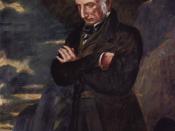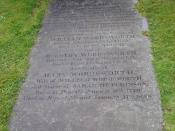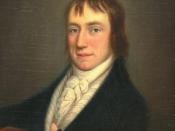Wordsworth's poems initiated the Romantic era by emphasizing feeling, instinct, and subjectivity above formality and mannerism. The themes that run through Wordsworth's poetry, and the language and imagery he uses to embody those themes, remain remarkably consistent throughout, adhering largely to the tenets Wordsworth set out for himself. Wordsworth argues that poetry should be written in the natural language of common speech, rather than in the lofty and elaborate dictions He argues that poetry should offer access to the "emotions recollected in tranquillity". Nature plays a vital role in the creation of Wordsworth's poetry. Nature acts as Wordsworth's muse.
Wordsworth was a pantheist, he believed that everything is a manifestation of Nature and that God existed in Nature. For Wordsworth, Nature acted as a philosopher, guide, friend and mentor. This has clearly been seen in "The Nutting" and "From the Prelude". In the Nutting , he is drawing upon an incident which took place during his childhood where he is awe of the external appearance of nature and wants to destroy it.
As soon as he performs this gruesome act, he is overcome by a new realisation at the sense of pain of his destruction of Nature. There is a feeling of repentance and regret after he destroys the once untouched scene. His consciousness is aroused by Nature and he is awakened by the spirituality in the woods. In his poem From the Prelude, he recalls another childhood experience where he steals a boat. As he quietly sails through the water, there is a sense of pride and excitement. But, when he approaches a crag that appeared to stride after him like a living thing, feeling of fear and guilt are aroused within him. The crag, which is described as "huge" and "black", intimidates him, it is a part of...



Wordsworth
This is a bright essay on the poems and portyal of them by Wordsworth. One of my favourite poems by Wordsworth is the Dafodils, which is too do with nature, clearly!! You have done a good job expalining how his poems teach us to apperciate nature. Nice effort indeed.
2 out of 2 people found this comment useful.